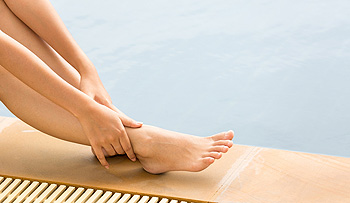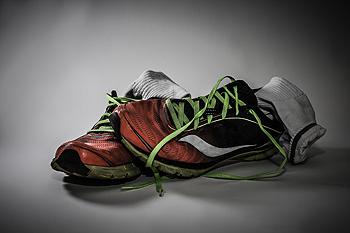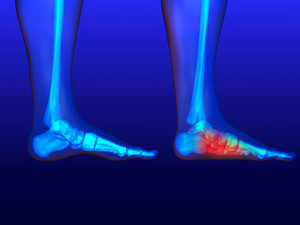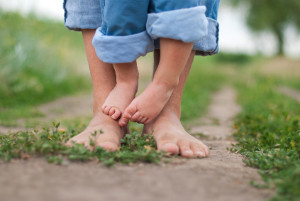October 2019
Stress Fractures in the Feet
 Patients who have had a stress fracture in the foot are often aware of the pain and discomfort it can typically cause. It can occur as a result of overuse from participating in sporting activities, or from standing for the majority of the day. Many people feel the pain after an activity is completed, and it may be difficult to walk. Additional reasons why this type of injury may occur can include changing footwear, increasing the intensity of training, or from running on different surfaces than what one is accustomed to. Relief may be felt when the affected foot is elevated, and the activity that caused the fracture is ceased. Stress fractures may be prevented when the feet are properly warmed up and stretched. If you feel you have endured a stress fracture, it is strongly advised that you schedule a consultation with a podiatrist who can properly treat this condition.
Patients who have had a stress fracture in the foot are often aware of the pain and discomfort it can typically cause. It can occur as a result of overuse from participating in sporting activities, or from standing for the majority of the day. Many people feel the pain after an activity is completed, and it may be difficult to walk. Additional reasons why this type of injury may occur can include changing footwear, increasing the intensity of training, or from running on different surfaces than what one is accustomed to. Relief may be felt when the affected foot is elevated, and the activity that caused the fracture is ceased. Stress fractures may be prevented when the feet are properly warmed up and stretched. If you feel you have endured a stress fracture, it is strongly advised that you schedule a consultation with a podiatrist who can properly treat this condition.
Stress fractures occur when there is a tiny crack within a bone. To learn more, contact Dr. Scott Shrem from Garden State Foot & Ankle Center. Our doctor can provide the care you need to keep you pain free and on your feet.
How Are They Caused?
Stress fractures are the result of repetitive force being placed on the bone. Since the lower leg and feet often carry most of the body’s weight, stress fractures are likely to occur in these areas. If you rush into a new exercise, you are more likely to develop a stress fracture since you are starting too much, too soon. Pain resulting from stress fractures may go unnoticed at first, however it may start to worsen over time.
Risk Factors
- Gender – They are more commonly found in women compared to men.
- Foot Problems – People with unusual arches in their feet are more likely to develop stress fractures.
- Certain Sports – Dancers, gymnasts, tennis players, runners, and basketball players are more likely to develop stress fractures.
- Lack of Nutrients – A lack of vitamin D and calcium may weaken the bones and make you more prone to stress fractures
- Weak Bones – Osteoporosis can weaken the bones therefore resulting in stress fractures
Stress fractures do not always heal properly, so it is important that you seek help from a podiatrist if you suspect you may have one. Ignoring your stress fracture may cause it to worsen, and you may develop chronic pain as well as additional fractures.
If you have any questions, please feel free to contact our office located in Hazlet, NJ . We offer the newest diagnostic and treatment technologies for all your foot care needs.
Correct Shoes for Different Types of Running
 When choosing running shoes that fit correctly, it is important to properly measure your foot. This is helpful in determining the correct size that provides maximum comfort. There are several different forms of running styles, and it is wise to purchase running shoes that correlate with your choice. While running on uneven surfaces, the feet will feel better when flexible shoes are worn, and this can be helpful in providing ample support and cushioning. There are shoes that are designed for running on trails where rocks and mud may be present. These types of shoes have additional tread which can be beneficial in providing the support that is needed while engaging in this type of running. If you have questions about running shoes, it is suggested that you consult with a podiatrist who can guide you toward choosing shoes that are correct for you.
When choosing running shoes that fit correctly, it is important to properly measure your foot. This is helpful in determining the correct size that provides maximum comfort. There are several different forms of running styles, and it is wise to purchase running shoes that correlate with your choice. While running on uneven surfaces, the feet will feel better when flexible shoes are worn, and this can be helpful in providing ample support and cushioning. There are shoes that are designed for running on trails where rocks and mud may be present. These types of shoes have additional tread which can be beneficial in providing the support that is needed while engaging in this type of running. If you have questions about running shoes, it is suggested that you consult with a podiatrist who can guide you toward choosing shoes that are correct for you.
If you are a runner, wearing the right running shoe is essential. For more information, contact Dr. Scott Shrem from Garden State Foot & Ankle Center. Our doctor can provide the care you need to keep you pain-free and on your feet.
Choosing the Right Running Shoe for Your Foot Type
To increase performance and avoid the risk of injury, it is important to choose the right running shoe based on your foot type. The general design of running shoes revolves around pronation, which is how the ankle rolls from outside to inside when the foot strikes the ground.
- Neutral runners are able to choose from a wide variety of shoes, including minimalist shoes or even going barefoot.
- Runners who overpronate, or experience an over-abundance of ankle rolling, should choose shoes that provide extra motion control and stability.
- Runners who underpronate, or supinate, have feet that have high arches and lack flexibility, preventing shock absorption. They require shoes with more flexibility and cushion.
If you have any questions please feel free to contact our office located in Hazlet, NJ . We offer the newest diagnostic and treatment technologies for all your foot and ankle needs.
Stretches for Flat Feet
 The medical condition that is referred to as flat feet is also known as fallen or collapsed arches. This can occur as a result of an injury that has happened to the foot, genetic factors, or medical reasons that may include arthritis or pregnancy. Patients may experience pain and discomfort as a result of having this ailment, and it may affect the overall alignment of the body. Research has indicated there are stretches that can be performed which may be helpful in strengthening the feet. An effective way to stretch the heel is to extend one leg behind the other. As the heels are pressing into the floor, the heels and Achilles tendon are stretched. Some patients also find that it helps to roll their feet on top of a tennis or golf ball. This may help to stretch and strengthen the plantar fascia. If you have flat feet and would like additional information about how to perform stretches, please consult with a podiatrist.
The medical condition that is referred to as flat feet is also known as fallen or collapsed arches. This can occur as a result of an injury that has happened to the foot, genetic factors, or medical reasons that may include arthritis or pregnancy. Patients may experience pain and discomfort as a result of having this ailment, and it may affect the overall alignment of the body. Research has indicated there are stretches that can be performed which may be helpful in strengthening the feet. An effective way to stretch the heel is to extend one leg behind the other. As the heels are pressing into the floor, the heels and Achilles tendon are stretched. Some patients also find that it helps to roll their feet on top of a tennis or golf ball. This may help to stretch and strengthen the plantar fascia. If you have flat feet and would like additional information about how to perform stretches, please consult with a podiatrist.
Flatfoot is a condition many people suffer from. If you have flat feet, contact Dr. Scott Shrem from Garden State Foot & Ankle Center. Our doctor will treat your foot and ankle needs.
What Are Flat Feet?
Flatfoot is a condition in which the arch of the foot is depressed and the sole of the foot is almost completely in contact with the ground. About 20-30% of the population generally has flat feet because their arches never formed during growth.
Conditions & Problems:
Having flat feet makes it difficult to run or walk because of the stress placed on the ankles.
Alignment – The general alignment of your legs can be disrupted, because the ankles move inward which can cause major discomfort.
Knees – If you have complications with your knees, flat feet can be a contributor to arthritis in that area.
Symptoms
- Pain around the heel or arch area
- Trouble standing on the tip toe
- Swelling around the inside of the ankle
- Flat look to one or both feet
- Having your shoes feel uneven when worn
Treatment
If you are experiencing pain and stress on the foot you may weaken the posterior tibial tendon, which runs around the inside of the ankle.
If you have any questions please feel free to contact our office located in Hazlet, NJ . We offer the newest diagnostic and treatment technologies for all your foot and ankle needs.
How to Take Care of Children’s Feet
The importance of properly taking care of your child’s feet is crucial in possibly preventing certain foot conditions from developing. Children’s feet may be sweaty for the majority of the day, and it is important to wash and dry them on a daily basis. This may prevent athlete’s foot from occurring. Research has indicated that children's feet may become stronger when they can walk barefoot while indoors. This can be a result of the grasping motion that occurs when the toes touch the floor. Ingrown toenails may be prevented when the toenails are cut frequently and in a straight line. Additionally, when it is time for your child to walk outside, it is helpful to purchase shoes that fit properly. This can be accomplished by measuring your child’s foot to determine the correct shoe size. If you would like more information about how to take care of your child’s feet, it is suggested that you speak with a podiatrist.
The health of a child’s feet is vital to their overall well-being. If you have any questions regarding foot health, contact Dr. Scott Shrem of Garden State Foot & Ankle Center. Our doctor can provide the care you need to keep you pain-free and on your feet.
Tips for Keeping Children's Feet Healthy
- Make sure their shoes fit properly
- Look for any signs of in-toeing or out-toeing
- Check to see if they have Clubfoot (condition that affects your child’s foot and ankle, twisting the heel and toes inward) which is one of the most common nonmajor birth defects.
- Lightly cover your baby’s feet (Tight covers may keep your baby from moving their feet freely, and could prevent normal development)
- Allow your toddler to go shoeless (Shoes can be restricting for a young child’s foot)
- Cut toenails straight across to avoid ingrown toenails
- Keep your child’s foot clean and dry
- Cover cuts and scrapes. Wash any scratches with soap and water and cover them with a bandage until they’ve healed.
If you have any questions, please feel free to contact our office located in Hazlet, NJ . We offer the newest diagnostic and treatment technologies for all your foot care needs.
Do Your Child's Feet Hurt?
How to Take Care of Children’s Feet
The importance of properly taking care of your child’s feet is crucial in possibly preventing certain foot conditions from developing. Children’s feet may be sweaty for the majority of the day, and it is important to wash and dry them on a daily basis. This may prevent athlete’s foot from occurring. Research has indicated that children's feet may become stronger when they can walk barefoot while indoors. This can be a result of the grasping motion that occurs when the toes touch the floor. Ingrown toenails may be prevented when the toenails are cut frequently and in a straight line. Additionally, when it is time for your child to walk outside, it is helpful to purchase shoes that fit properly. This can be accomplished by measuring your child’s foot to determine the correct shoe size. If you would like more information about how to take care of your child’s feet, it is suggested that you speak with a podiatrist.
Making sure that your children maintain good foot health is very important as they grow. If you have any questions, contact Dr. Scott Shrem of Garden State Foot & Ankle Center. Our doctor can provide the care you need to keep you pain-free and on your feet.
Keeping Children's Feet Healthy
Having healthy feet during childhood can help prevent medical problems later in life, namely in the back and legs. As children grow, their feet require different types of care. Here are some things to consider...
Although babies do not walk yet, it is still very important to take care of their feet.
Avoid putting tight shoes or socks on his or her feet.
Allow the baby to stretch and kick his or her feet to feel comfortable.
As a toddler, kids are now on the move and begin to develop differently. At this age, toddlers are getting a feel for walking, so don’t be alarmed if your toddler is unsteady or ‘walks funny’.
As your child gets older, it is important to teach them how to take care of their feet.
Show them proper hygiene to prevent infections such as fungus.
Be watchful for any pain or injury.
Have all injuries checked by a doctor as soon as possible.
Comfortable, protective shoes should always be worn, especially at play.
If you have any questions please feel free to contact our office located in Hazlet, NJ . We offer the newest diagnostic and treatment technologies for all your foot and ankle needs.
Blog Archives
- April 2025
- March 2025
- February 2025
- January 2025
- December 2024
- November 2024
- October 2024
- September 2024
- August 2024
- July 2024
- June 2024
- May 2024
- April 2024
- March 2024
- February 2024
- January 2024
- December 2023
- November 2023
- October 2023
- September 2023
- August 2023
- July 2023
- June 2023
- May 2023
- April 2023
- March 2023
- February 2023
- January 2023
- December 2022
- November 2022
- October 2022
- September 2022
- August 2022
- July 2022
- June 2022
- May 2022
- April 2022
- March 2022
- February 2022
- January 2022
- December 2021
- November 2021
- October 2021
- September 2021
- August 2021
- July 2021
- June 2021
- May 2021
- April 2021
- March 2021
- February 2021
- January 2021
- December 2020
- November 2020
- October 2020
- September 2020
- August 2020
- July 2020
- June 2020
- May 2020
- April 2020
- March 2020
- February 2020
- January 2020
- December 2019
- November 2019
- October 2019
- September 2019
- August 2019
- July 2019
- June 2019
- May 2019
- April 2019
- March 2019
- February 2019
- January 2019
- December 2018
- November 2018
- October 2018
- September 2018
- August 2018
- July 2018
- June 2018
- May 2018
- April 2018
- March 2018










